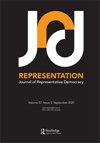国外政党。选举政治的新舞台
Q2 Social Sciences
引用次数: 1
摘要
这期特刊是国外关于政党的文献日益增多的一部分。扩大公民权改变并加强了移民与其祖国之间的公民和政治联系。政党面临着参与或不参与这个新的选举政治舞台的两难境地,必须考虑如何参与。然而,直到最近,关于跨国主义和政党政治的文献出人意料地在很大程度上忽略了这个问题。本引言确定了文献中存在的差距,并强调了两个主要问题,即(1)政党为什么以及如何决定在国外竞选,以及(2)海外选民如何接受这些竞选活动,并在这一特定背景下操作他们的政党选择。这五篇文章提供了案例研究和比较视角,定量和定性分析的混合。这一案例选择有助于探讨国外政党在不同环境下使用不同工具所采取的策略的多样性。结果表明,地方党支部和企业家的外联活动以及地方运动对动员、投票率和选举结果的影响,但也表明,移民的投票选择受到其原籍国和居住国背景的影响。本文章由计算机程序翻译,如有差异,请以英文原文为准。
Political Parties Abroad. A New Arena for Electoral Politics
ABSTRACT This Special Issue contributes to the growing literature on parties abroad. Expansive citizenship has transformed and reinforced the civic and political links between emigrants and their home country. Political parties face the dilemma of engaging or not in this new arena for electoral politics and must consider how. However, until recently the literature on transnationalism and on party politics has surprisingly largely overlooked this issue. This introduction identifies the existing gaps in the literature, and stresses two main questions that remains largely unanswered, namely (1) why and how parties decide to campaign abroad, and (2) how voters abroad are receptive to these campaigns and operate their party choice in this specific context. The five articles offer a mix of case studies and comparative perspective, and quantitative and qualitative analyses. This case selection allows to explore the diversity of strategies adopted by political parties abroad in different settings, with different tools. The results illustrate the impact of local party branches and entrepreneurs’ outreach and local campaigns on mobilisation, turnout, and the result of elections, but also show that emigrants’ vote choice is influenced both by the context of their country of origin and of their country of residence.
求助全文
通过发布文献求助,成功后即可免费获取论文全文。
去求助
来源期刊

Representation
Social Sciences-Sociology and Political Science
CiteScore
3.50
自引率
0.00%
发文量
31
期刊介绍:
This change in scope follows two paths. Firstly, it seeks contributors who are interested in exploring the interface between democratic practice and theory. In particular, this focus seeks contributions that apply theoretical insights to actual examples of current practice. Secondly, while not neglecting the current focus of the journal, we would like to expand its international coverage so that the journal will offer our readers insights in the state of democracy worldwide.
 求助内容:
求助内容: 应助结果提醒方式:
应助结果提醒方式:


